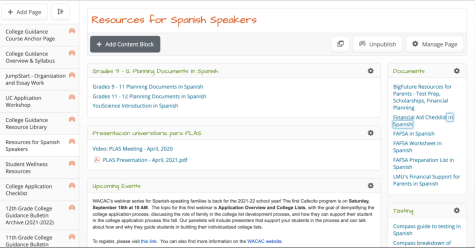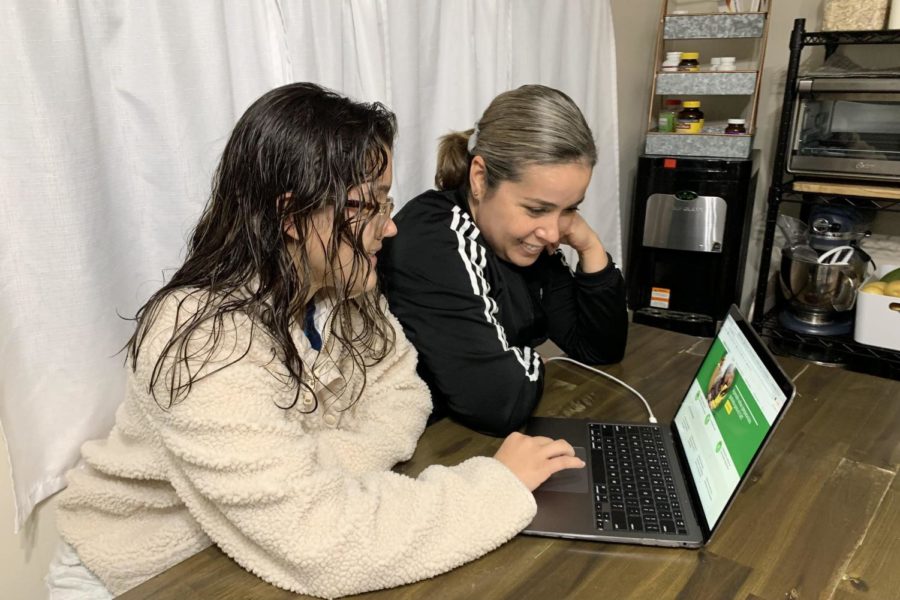Reporter Lizette Gonzalez conducted Marizabel Garibaldi’s interview in Spanish and translated it to English for the purpose of this piece.
For junior Helen Solis, college applications have become a topic of conversation at school and her home. Although she has seen her brother go through the process, he experienced it independently due to their parents facing language barriers, so Solis is unsure of what it is like. Coming from a primarily Spanish-speaking family, she hopes that her experience has more communication between her counselor and her parents.
“Language barriers aren’t our fault and shouldn’t bring us down,” Solis said. “My brother’s process was my family’s first encounter with college, and we didn’t know how to help.”
Juniors from Spanish-speaking families have begun to meet with Archer’s college counselors, since Archer’s college guidance program begins in junior year. Director of College Guidance Ivan Hauck said that they are building a page on Archer’s Learning Hub and human development curriculum that includes resources in Spanish. He said giving access to these resources is an integral part of ensuring communication with Spanish-speaking families.
“Language is the most important piece of communication, and every student and family absolutely needs to have access to these important documents and important information,” Hauck said. “We are not doing our job if we are not providing all of this information in a way that can be understood by everyone in our community.”
Hauck said that meeting individually with students from Spanish-speaking families allowed him to better understood their experience. He added that he wishes to see more conversations around this topic emerge at Archer.
“Hearing [their] personal stories was profound for me in understanding all of the additional steps Spanish-speaking students go through,” Hauck said. “Whether that’s translating or helping their families navigate this, my hope would be that everybody at Archer fully understands [this experience]. Not only for Spanish speakers, but for any heritage language speaker or any student and family who’s experiencing something in a different way than the norm at Archer.”

Junior Samantha Garibaldi is close to starting the college process and said that she has seen how her family wants to engage with Archer more. She adds that the language barrier limits her family and is something that intimidates them.
“It’s important for our families to fully understand what the school is doing to set us up for success,” Garibaldi said. “My family wants to be involved and know what’s going on. They often feel left out of the loop or don’t know about many events because they struggle with finding or reading emails, or just having the language barrier limiting their involvement.”
Earlier this year, Solis said she has started to talk to college guidance counselors about how to support her family and herself best during the process.
“I’ve seen that [college guidance] has been reaching out to us to see if we have any questions ahead of time,” Solis said. “They have started to be that support system and have shown that they are open to having calls with our families and having a translator present to help out.”
Senior Andrea Ramirez, who is close to finishing her college application journey, acknowledges the effort she has seen from Archer’s college counselors. She hopes that resources are expanded for future seniors with Spanish-speaking parents because for her family, communication was key.
“Mr. Hauck and Dr. Leggins made a big effort to keep my Spanish-speaking parents in the loop. They sent consistent emails to update them with what’s going on, so I think that Archer has done a pretty good job to hold my parents’ hands as well as mine,” Ramirez said. “I think they still have room to grow, and I know they are planning to grow. It’s about making a bigger effort than [for] a traditional parent. It’s hard to get involved when you don’t know what you’re getting involved in.”
For senior Anny Rodriguez-Alcala, she recognized that her family’s struggles stemmed from issues with maneuvering technology and the underlying obstacle of applying to colleges in a pandemic. She adds that it felt like her and her counselor weren’t connected with her parents because of lack of information coupled with the language barrier.
“It was more of an ‘us’ thing rather than an ‘us and them.’ I hope incoming seniors that come from Spanish-speaking families can have the opportunity to physically come and be able to hear a Spanish informational session and fully grasp the information, rather than parents relying on students for it,” Rodriguez-Alcala said. “It’s not that parents don’t want to be involved, they truly do. It’s another added layer that students don’t mind doing, but one that needs to be talked about more.”
If we do not know the information correctly, that is a barrier for us. — Marizabel Garibaldi
Ramirez said that her college process was an opportunity for her parents to learn along with her.
“This process was both a learning process for me and for my parents. They learned what it’s like to apply to a college and they learned what it’s like to look for a college that is really fit for me,” Ramirez said. “Hopefully there’s a way for parents to be more engaged and more knowledgable without it being this weird Spanish translation that’s half there.”
As a parent, Marizabel Garibaldi said that anything involving her daughter’s education was important for her, and such information should reach parents clearly. She said that because the college process is a new stage of her daughter’s life, having information about it is imperative.
“It gives us another perspective, it teaches us to think in another way and to know that there are many more opportunities [for our children] and that it’s not actually difficult,” Marizabel Garibaldi said. “If we don’t have the information explained in a detailed way, we will always have certain fears or doubts. Many times it scares us as we don’t know — it scares us any step that [our daughter] wants to take due to the lack of information.”
Marizabel Garibaldi said the language barrier has been an impediment for her in other situations, as well, and reflected on the importance of parents helping each other.
“When I have gone to a meeting at Archer, I like to see how they invite people who get involved. If I’m honest, I have felt the urge to do so too, but because of the language barrier, one does not feel safe communicating with other people,” Marizabel Garibaldi said. “We become self-conscious and that is what stops people. Sometimes I say, if I could, maybe I would make a difference in helping other parents, no matter how little or how much I know, maybe I could do something for a parent who knows less than I do.”
Although Archer families speak multiple languages at home, there isn’t a current need for additional translation support besides Spanish. This year, for those who need assistance, Archer implemented an on-call translation service to ensure communication between teachers and parents. When teachers request a translation service, they fill out a document that asks the purpose and needs of the conversation. Then, teachers receive a notification when the service is set up. The timeline varies as teachers can request a phone call, a virtual conference or an in-person meeting. The translation service pairs up teachers and parents with a translator for the appropriate language.
Solis shared that having more accessibility and resources to families who don’t know English fluently will be beneficial for connection in all aspects, not only in regards to the college process.
“There’s a lot of things that aren’t translated, some are, but not all,” Solis said. “Informing these families is really going to create more connection and comfortability within families, and will get rid of this barrier that limits genuine connection.”
This story was originally published on The Oracle on January 17, 2022.



























![IN THE SPOTLIGHT: Junior Zalie Mann performs “I Love to Cry at Weddings,” an ensemble piece from the fall musical Sweet Charity, to prospective students during the Fine Arts Showcase on Wednesday, Nov. 8. The showcase is a compilation of performances and demonstrations from each fine arts strand offered at McCallum. This show is put on so that prospective students can see if they are interested in joining an academy or major.
Sweet Charity originally ran the weekends of Sept. 28 and Oct. 8, but made a comeback for the Fine Arts Showcase.
“[Being at the front in the spotlight] is my favorite part of the whole dance, so I was super happy to be on stage performing and smiling at the audience,” Mann said.
Mann performed in both the musical theatre performance and dance excerpt “Ethereal,” a contemporary piece choreographed by the new dance director Terrance Carson, in the showcase. With also being a dance ambassador, Mann got to talk about what MAC dance is, her experience and answer any questions the aspiring arts majors and their parents may have.
Caption by Maya Tackett.](https://bestofsno.com/wp-content/uploads/2024/02/53321803427_47cd17fe70_o-1-1200x800.jpg)
![SPREADING THE JOY: Sophomore Chim Becker poses with sophomores Cozbi Sims and Lou Davidson while manning a table at the Hispanic Heritage treat day during lunch of Sept 28. Becker is a part of the students of color alliance, who put together the activity to raise money for their club.
“It [the stand] was really fun because McCallum has a lot of latino kids,” Becker said. “And I think it was nice that I could share the stuff that I usually just have at home with people who have never tried it before.”
Becker recognizes the importance of celebrating Hispanic heritage at Mac.
“I think its important to celebrate,” Becker said. “Because our culture is awesome and super cool, and everybody should be able to learn about other cultures of the world.”
Caption by JoJo Barnard.](https://bestofsno.com/wp-content/uploads/2024/01/53221601352_4127a81c41_o-1200x675.jpg)






